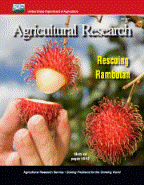United States Department of Agriculture: Agricultural Research Service, Lincoln, Nebraska

Agricultural Research Magazine
Date of this Version
3-2013
Document Type
Article
Citation
Agricultural Research March 2013.
Abstract
Plants use an enzyme known as “rubisco” to capture carbon dioxide from the atmosphere and, with energy from the sun and nutrients from the soil, build up the shoots, leaves, and stems that make up the plant itself. Scientists have known that for years. They also have known that temperatures are important. When it gets too hot, a rubisco helper protein called “rubisco activase” shuts down, photosynthesis stops, and the plant stops growing. Heat literally unravels the activase protein, and when it does, the result is a less bountiful harvest. Different plants shut down photosynthesis at different temperatures, and the process of unraveling the activase protein is known as “denaturation.”
Michael E. Salvucci, an Agricultural Research Service plant physiologist with the U.S. Arid-Land Agricultural Research Center, has teamed with Rebekka Wachter, associate professor of chemistry and biochemistry at Arizona State University, and Nathan Henderson, her postdoctoral research associate, to crystallize rubisco activase.
Crystallization will allow researchers to study the activase protein more closely, to visualize its structure, and possibly to manipulate its sequence so that it doesn’t unravel at higher temperatures. The findings could help in the search for genes that cue plants to synthesize more heat-stable versions of the protein. Crops with such enhanced proteins could thrive at higher temperatures.
Included in
Agriculture Commons, Animal Sciences Commons, Food Science Commons, Plant Sciences Commons

